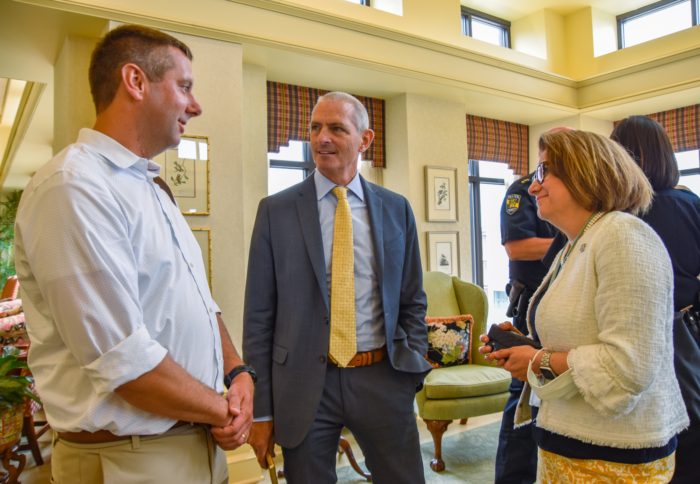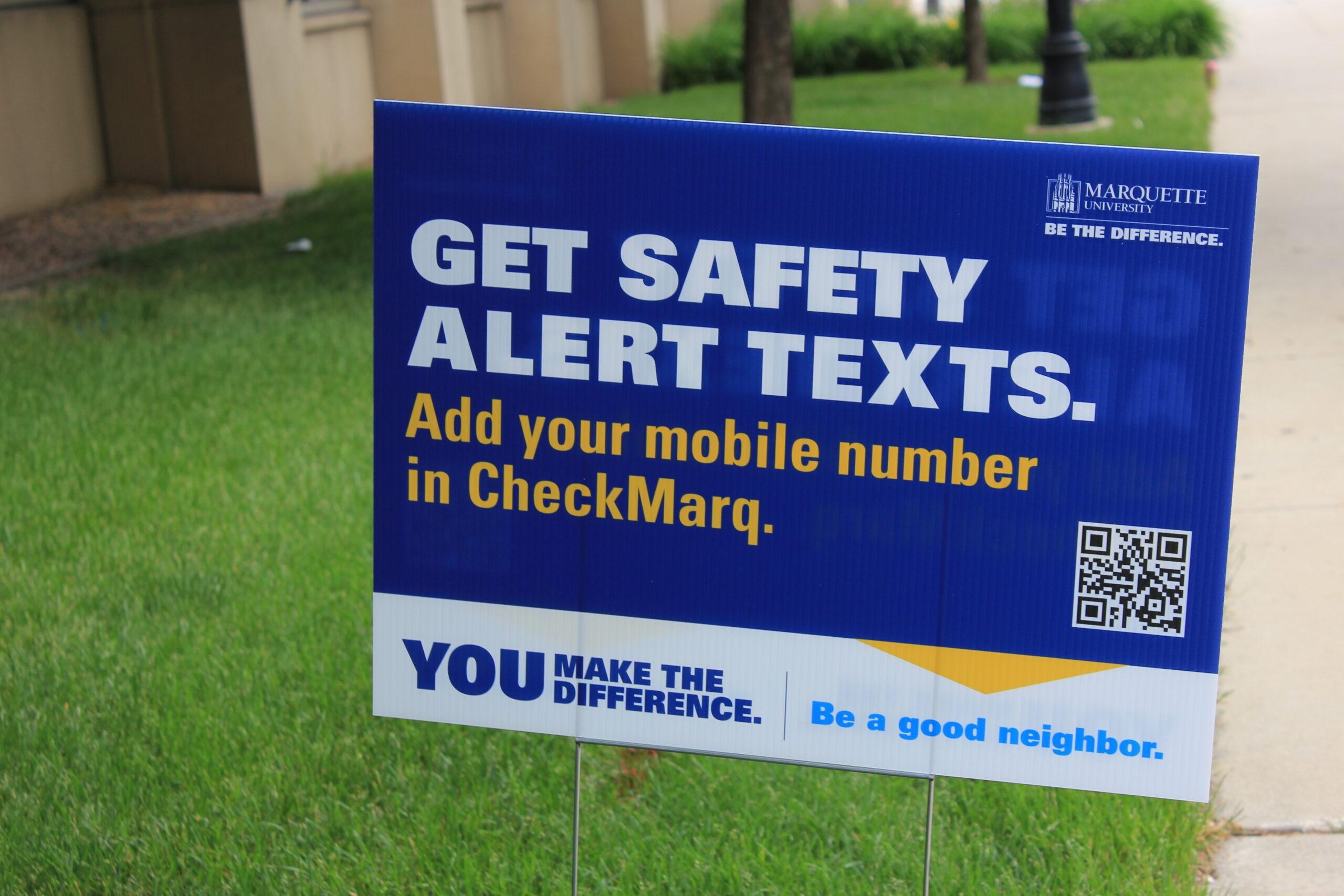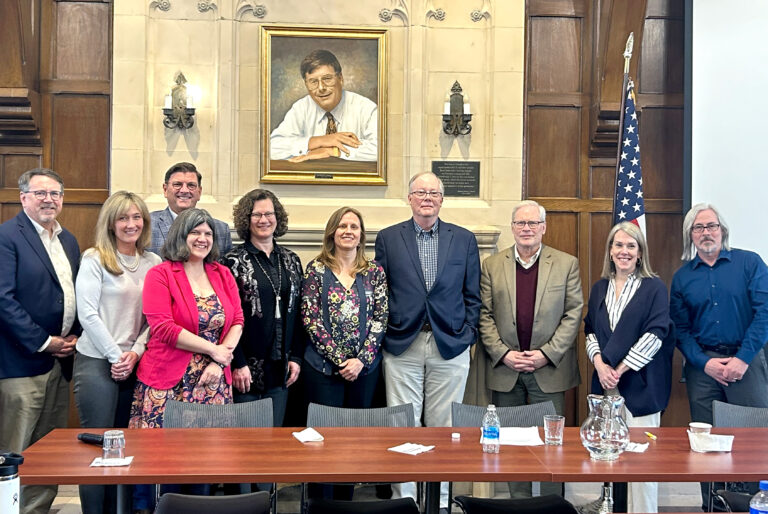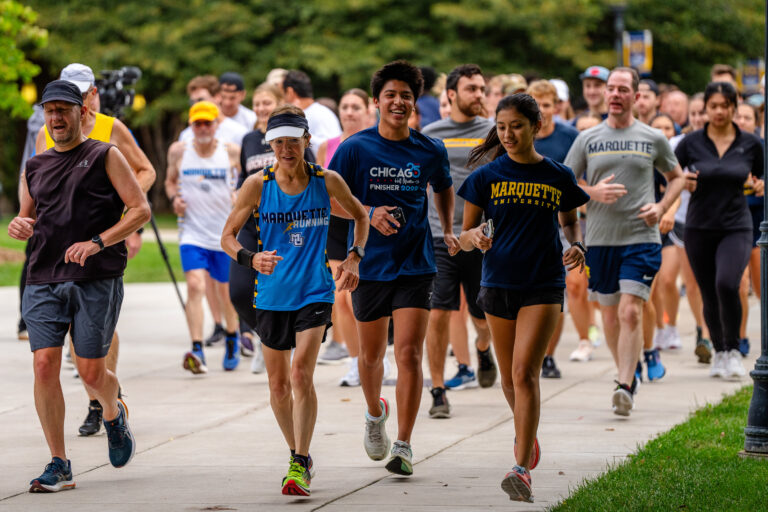The President’s Task Force on Community Safety on Tuesday, May 31, met for the final time before it moves into an implementation phase. Leaders from each safety workgroup presented their recommendations. Marquette University Police Department Chief Edith Hudson, chair of the task force, announced that the following proposals were approved by the university’s Executive Leadership Team for funding and implementation:
- Reimagine campus transportation. Student transportation, on campus and in the Milwaukee community, was one of the most consistently named areas of concern, given the difficulty recruiting LIMO drivers this past year. Marquette will take a two-pronged approach with an immediate action team developing solutions for this fall and, for the long-term, engaging professional services to assess the current transportation landscape, including a holistic list of transportation resources, challenges, preferences and recommend potential solutions. The LIMO and LIMO Express program remains active, and seven new drivers have been hired, while recruitment continues.
- Establish a Behavioral Health Unit within MUPD. In alignment with our mission and philosophy of policing by caring for the whole person, the university will create a Behavioral Health Unit within MUPD, including a mental health professional/behavioral health officer (BHO) and a law enforcement crisis worker (LECW). The BHO will work proactively with the LECW to identify and connect individuals in need of services who have, or are likely to have, repeated contact with police, and to divert individuals impacted by untreated mental illness from the criminal justice system whenever possible. The increasing volume of police calls for service and the complexities navigating our community’s mental health system have highlighted the need to expand our approach that allows two systems (criminal justice and mental health) to intersect and collaborate effectively to better serve our community.
- Expand the MUPD police aide program. Like most police departments across the country, MUPD is facing significant challenges when recruiting new officers, including a diminished talent pipeline from traditional police academies. MUPD will expand its current police aide program to three aides. (There is currently one aide position.) Police aides are civilian employees who serve a minimum of two years in a police apprentice-style program. Duties include department administrative and clerical functions. In addition, they will rotate through varied assignments to gain the broad experience necessary to prepare them for a role as an officer who will hold closely the MUPD mission. Upon completing the program, police aides will be provided preferential entry to a police officer academy class. This program seeks to expand and better diversify MUPD’s recruitment and supports the priorities of the Milwaukee Anchor Collaborative.
- Expand safety alert text availability to parents via an improved technology platform. The university will enhance its safety alert process by adopting a new service platform, which will allow parents to sign up for safety alert text messages. This move is based on frequent parent feedback, peer benchmarking and an assessment by MUPD, Information Technology Services and the university communication team members who are actively involved in the safety alert process. This will give parents the same accurate, timely information their students receive via text. The new platform will also streamline internal processes with tools that allow multi-channel deployment on one platform, an easy opt out/opt in process for parents and additional crisis response capabilities. The goal is to deploy this new technology platform and allow parents to opt into safety alert texts for the fall semester. In the meantime, parents can receive the same information from the texts by downloading the EagleEye app.
- Develop a holistic safety website. To make it easier for students, families, faculty and staff to find and use safety information online, the Office of University Relations will engage a user-experience expert to evaluate current safety web assets and recommend a new information architecture. In the meantime, the MUPD website has been updated and reorganized with safety alert criteria and processes, trainings, safety tips, resources and a safety FAQ.
- Create new safety signage for campus and the nearby neighborhood. As part of a larger action-oriented and consistent safety messaging strategy, yard signs, table tents and building signage have been created and will be used throughout the year to help our community become more proactive in their safety preparation. Signage is on display for all summer SPARK sessions, and more will be developed for New Student Orientation and the start of the academic year in August. The signs focus on proactive safety actions and remind our community to “be a good neighbor.”
- Create a student tour of the Near West Side neighborhood. To help students become more familiar with our surrounding neighborhood, the university will work with the Near West Side Partners to offer student tours of the neighborhood, highlighting safety tips, local assets and points of interest, such as local restaurants. The tour will be integrated with student orientation efforts and Family Weekend.
- Purchase two mobile cameras/lights for MUPD to deploy to areas of repeat crime. These units can be quickly deployed to locations of concern in our patrol zone and are effective in deterring crime. The camera may permit faster response and more effective investigations. Additionally, this highly visible policing equipment shows police attention even if officers might not be physically present.
- Complete a campus lighting assessment and involve city officials for updates to public lighting. The university will complete a campus lighting assessment and work with the city to fix inoperable city streetlights on and near campus, such as along Kilbourn Avenue.
- Increase annual budget for camera maintenance and repair. Functioning surveillance cameras are critical to the university’s safety infrastructure. With recent approval to install more cameras, the annual budget allotment for camera maintenance and replacement will be increased to ensure ongoing camera maintenance.
- Increase “under surveillance” signage on campus. Studies show that such signs help deter crime. The university will install more signs to alert people that they are under surveillance and increase visibility of the safety camera infrastructure in place.
- Establish the Marquette University Enhancing Safety Through Environmental Design Committee (ESTED). This standing committee will oversee the university’s process and policies for preventing crime through environmental design. The committee will make recommendations to the senior vice president and chief operating officer on priorities and resources needed to support ongoing campus and community safety and security, including campus building access policies and pedestrian safety priorities.

Implementing safety solutions
At the conclusion of the Task Force meeting, President Lovell shared his gratitude with the members of the safety task force, acknowledging the focus and speed in evaluating possibilities and developing thoughtful proposals for long-term solutions. Moving forward, a smaller implementation team will oversee and track project progress. This team includes the leads for each approved action; they will meet regularly to report on progress and share any changes.
As implementation moves ahead, the university will share updates and provide more information so students, faculty, staff, parents and our neighbors as needed. This will include updates on implementing secure access to all residence halls after the successful pilot with Humphrey Hall this year.
Watch Marquette Today for updates.



